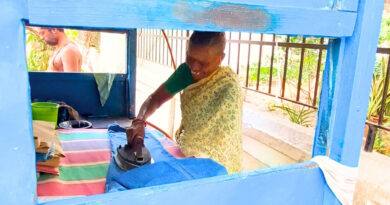From Cannes With Love: The Story Of The Kerala Nurses’
India’s Palme d’Or curse is broken in Cannes by the story of Kerala nurses.
A heartbreakingly long absence from the Palme d’Or competition for Indian cinema had to end with the story of two nurses from Kerala. The protagonists of Mumbai-born filmmaker Payal Kapadia’s All We Imagine As Light, Prabha and Anu, have made India’s comeback to the Cannes film festival’s renowned competition section, which has been frequented for decades by industry greats like Satyajit Ray and Mrinal Sen.

The last Indian film to vie for the top award at Cannes was Swaham (My Own), directed by Malayalam filmmaker Shaji N. Karun in 1994. Shaji and Kapadia are both former students of the Pune-based Film and Television Institute of India (FTII). The principal roles of the nurses in the Hindi and Malayalam language production All We Imagine As Light are portrayed by two Malayalam actors, Kani Kusruti and Divya Prabha.
The latest Indian film to be nominated for the Palme d’Or, the top prize at the Cannes Film Festival, in thirty years is Mumbai born Payal Kapadia’s All We Imagine As Light.

Thirty years ago, when Swaham was chosen for the Cannes competition, world cinema icons Krzysztof Kieślowski (Poland), Abbas Kiarostami (Iran) (Through the Olive Trees), and Zhang Yimou (China) were seated alongside Karun at the top table. That year, American newcomer Quentin Tarantino’s first feature film, Pulp Fiction, took home the Palme d’Or.

This year’s Cannes festival, which runs from May 14–25, will feature cinematic heavyweights like French director Jacques Audiard, Italian director Paolo Sorrentino, Chinese director Jia Zhangke, American director Francis Ford Coppola, Canadian director David Cronenberg, Italian director Paolo Sorrentino, and another American legend, Paul Schrader, competing for the Palme d’Or. Kapadia will be competing against them. Previous Cannes Grand Prize winners include Audiard and Coppola.
Swaham, directed by Malayalam filmmaker Shaji N. Karun, was the final Indian film to compete in the coveted Cannes competition section in 1994.

The competition segment and other categories, such as Un Certain Regard for New Voices in World Cinema, which this year features Indian-origin filmmaker Sandhya Suri’s debut feature film, Santosh, were officially revealed in Paris on April 11.
To date, no Indian film has taken home the Palme d’Or, with Satyajit Ray’s 1956 film Pather Panchali being the only exception. It is still regarded by the film industry as a grave mistake. Rather, the competition section’s Pather Panchali took home the Cannes Best Human Document prize.
Karun, who wore traditional clothing to present Swaham on the red carpet thirty years ago, was one of the first people in the Indian cinema business to congratulate Kapadia on making history.
Thirty years ago, Shaji N. Karun (middle) attended the global premiere of Swaham in Cannes.
Karun believes Payal Kapadia, a young director based in Mumbai, is absorbing a higher quality of cinematic philosophy that gives her works a unique sense of aesthetics and visual language. “Indian cinema should take Payal Kapadia’s lead in the future,” Karun says.
Karun, who served as head of jury for the 2020 Mumbai International Film Festival (MIFF) and gave her short film And What Is The Summer Saying the Most Innovative and Experimental Film prize, says of Palal, “Payal has the rare ability to recognise the disappearing light and sound in front of her to make cinema enlightening.” “Payal’s gender interpretations in her works allow them to stand out in Indian cinema,” continues Karun, whose 1989 first film Piravi earned him a Camera d’Or Mention at Cannes.
According to Karun, “We immediately corrected a mistake in Payal’s film submission to MIFF and presented the award because a work of art deserves respect over an error on paper.”
He remembers carrying Sukhwant Singh Dadha, his fellow FTII batchmate, and a bulky steel box filled with Swaham’s reels to the Santa Cruz, Mumbai, customs office in 1994.
And What is the Summer Saying, which made its debut at the 2018 Berlin Film Festival, went on to win the Special Jury Prize at the world’s most prestigious documentary film festival, the International Documentary Film Festival in Amsterdam.
Cannes is no stranger to Kapadia. Afternoon Clouds, a short film directed by Kapadia, was chosen by the Cannes festival in 2017 as the inaugural FTII student film for their film school competition, which is now called La Cinef. The director’s experience living with her nonagenarian grandmother, who needed a nurse day and night for care, served as the inspiration for Afternoon Clouds, the narrative of two Keralan nurses working at a Mumbai hospital, and All We Imagine As Light.
In 2017, Payal Kapadia’s short film Afternoon Clouds became the first Indian film to be chosen for the Cannes film festival’s international competition for film schools.
The renowned artist Kapadia, whose 2017 painting is titled All We Imagine as Light, is the daughter of renowned artist Nalini Malani. In 2020, at the height of the coronavirus pandemic, Kapadia made history by being the first Indian to be accepted into the Cannes festival’s Cinefondation Résidence programme, which assists young directors from all over the world pursuing their first or second feature films. Her online proposal was titled “All We Imagine As Light.”
Past participants in the Cannes Cinefondation Résidence programme included the renowned Romanian director Corneliu Porumboiu, the Hungarian László Nemes, who won the 2016 Academy Award for Best Foreign Language Film for Son of Saul, and the Lebanese actor-director Nadine Labaki, who is nominated for the Best Foreign Language Film Oscar in 2019 for Capernaum.
In All We Imagine As Light, two Keralan nurses named Prabha (Kani Kusruti) and Anu (Divya Prabha), who work in a Mumbai nursing home, share a poignant tale about the delicate gender and cultural politics of the nation. Prabha’s life is thrown into chaos when her estranged spouse gives her an unexpected present. Her younger flatmate Anu looks for a spot to have an intimate moment with her boyfriend in the interim. The two nurses are forced to abandon the guidelines that have guided their life up to this point in favour of a day vacation to a seaside town.
The Hubert Bals Bright Futures Fund for script and project development, worth 9000 euros (about 800,000 rupees), was awarded to Kapadia’s proposal in 2019 by the Rotterdam International Film Festival. Kapadia began writing All We Imagine As Light in 2017, but she didn’t finish it until late 2018 when she participated in the PJLF Three Rivers writing residency in Rome.
The British director Andrea Arnold’s Cow, the American director Todd Haynes (The Velvet Underground), and the American Oliver Stone (JFK Revisited: Through the Looking Glass) fought it out for the Golden Eye Award for Best Documentary in 2021. Bird, the latest film from Andrea Arnold, is vying for the Palme d’Or; if it wins an Indian film festival, Kapadia will be motivated to bring the picture home for the first time ever.




